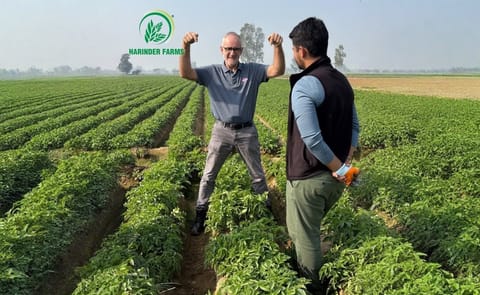Flying drone
Mumbai’s Drone Expo Showcases How The Power of Agriculture Drones Is Transforming Indian Farming

India's agricultural sector is experiencing a wave of innovation, with the introduction of new tools and technologies aimed at boosting crop productivity and profits for farmers.
One such innovation is the use of agricultural drones, which are being developed by various startups in collaboration with research institutions and government agencies.
These drones have the capability to oversee crops, ensure safety, and spray fertilizers and pesticides in fields. By harnessing the power of drones, Indian farmers can optimize crop monitoring, enhance efficiency, and reduce costs.
At the Drone Expo on 5-7 October, at Bombay Exhibition Center, NESCO, Mumbai, following Drone startups exhibited their drones for the agricultural sector:
Drogodrones: Founded in 2017, Drogodrones builds autonomous hybrid drones for aerial surveying, surveillance, and rescue applications.
Nalwa Aero: Nalwa Aero offers drone-based solutions for crop protection services, farming, and yield monitoring services in the agriculture sector.
AVI Drones: AVI Drones specializes in developing drone-based agri-intelligence and agri-automation solutions for precision agriculture and early detection of crop diseases.
Dronetech Solutions: Dronetech Solutions focuses on providing drones for aerial spraying of fertilizers, pesticides, and other agrochemicals. These startups have partnered with government agencies, research institutions, and industry leaders to develop innovative solutions for farmers.
Real-life success stories highlight the benefits of drone technology in agriculture. For instance, Shankaranand Chougule, an agriculture graduate from Maharashtra, invested in a drone due to labor shortages.
Using the drone, he was able to spray pesticides and insecticides more efficiently, reducing chemical usage and saving time.
Similarly, Vivek Apte from Ranegaon village in Ahmednagar district sprayed over 100 acres of farmland using drones, resulting in improved crop health and reduced costs.
The use of agricultural drones is subject to regulations set by the Directorate General of Civil Aviation (DGCA). Drone pilots need to obtain certifications and adhere to specific guidelines for safe and legal operation.
Farmers can access drone services through various service providers or agriculture startups that offer drone-based solutions. They can also explore partnerships with research institutions or government agencies promoting the use of drones in agriculture.
The Indian government has taken proactive measures to promote the use of agricultural drones in farming practices. It has introduced specific regulations and guidelines related to drone operations in the agriculture sector.
These policies aim to ensure safe and responsible drone usage while maximizing their benefits for farmers. The government encourages partnerships between startups, research institutions, and farmers to facilitate the adoption of drone technology.
Drones are aiding to farming practices by offering a range of applications in agriculture. They provide real-time crop monitoring, enabling farmers to detect early signs of disease, nutrient deficiencies, or water stress. Drones also facilitate precision spraying of fertilizers and pesticides, reducing chemical wastage and ensuring targeted application.
Additionally, they aid in mapping land topography, optimizing irrigation systems, and assessing crop health for better yield optimization. By using drones for spraying chemicals, farmers can reduce pesticide usage by up to 70% compared to traditional methods.
This leads to significant cost savings on chemicals while also minimizing environmental impact. A drone can spray an acre of farmland in just 10-12 minutes compared to the three to four hours it takes manually. This time efficiency allows farmers to cover more land in less time, increasing productivity and reducing labor requirements.
Drones are particularly useful in hilly terrains where it may be challenging for traditional equipment to reach. Drones can navigate difficult terrain more easily and provide precision spraying in such areas.
Aerial imagery captured by drones can help identify crop diseases by detecting changes in plant health and growth patterns. This early detection enables prompt action to mitigate disease spread.
Agricultural drones facilitate precision spraying, reducing chemical wastage and minimizing environmental impact. They also enable efficient resource utilization, leading to sustainable farming practices.
Some state governments offer subsidies or financial assistance programs to encourage farmers to adopt drone technology in agriculture. Agricultural drones are transforming farming practices in India by improving crop monitoring, precision spraying, and yield optimization.
The government's support and collaboration with startups have paved the way for the adoption of drone technology in the agriculture sector.
Farmers can benefit from cost savings, reduced chemical usage, and increased productivity. As a leading non-banking financial company, Shriram Finance is committed to supporting farmers' financial needs through innovative credit solutions.
One such innovation is the use of agricultural drones, which are being developed by various startups in collaboration with research institutions and government agencies.
These drones have the capability to oversee crops, ensure safety, and spray fertilizers and pesticides in fields. By harnessing the power of drones, Indian farmers can optimize crop monitoring, enhance efficiency, and reduce costs.
At the Drone Expo on 5-7 October, at Bombay Exhibition Center, NESCO, Mumbai, following Drone startups exhibited their drones for the agricultural sector:
Drogodrones: Founded in 2017, Drogodrones builds autonomous hybrid drones for aerial surveying, surveillance, and rescue applications.
Nalwa Aero: Nalwa Aero offers drone-based solutions for crop protection services, farming, and yield monitoring services in the agriculture sector.
AVI Drones: AVI Drones specializes in developing drone-based agri-intelligence and agri-automation solutions for precision agriculture and early detection of crop diseases.
Dronetech Solutions: Dronetech Solutions focuses on providing drones for aerial spraying of fertilizers, pesticides, and other agrochemicals. These startups have partnered with government agencies, research institutions, and industry leaders to develop innovative solutions for farmers.
Real-life success stories highlight the benefits of drone technology in agriculture. For instance, Shankaranand Chougule, an agriculture graduate from Maharashtra, invested in a drone due to labor shortages.
Using the drone, he was able to spray pesticides and insecticides more efficiently, reducing chemical usage and saving time.
Similarly, Vivek Apte from Ranegaon village in Ahmednagar district sprayed over 100 acres of farmland using drones, resulting in improved crop health and reduced costs.
The use of agricultural drones is subject to regulations set by the Directorate General of Civil Aviation (DGCA). Drone pilots need to obtain certifications and adhere to specific guidelines for safe and legal operation.
Farmers can access drone services through various service providers or agriculture startups that offer drone-based solutions. They can also explore partnerships with research institutions or government agencies promoting the use of drones in agriculture.
The Indian government has taken proactive measures to promote the use of agricultural drones in farming practices. It has introduced specific regulations and guidelines related to drone operations in the agriculture sector.
These policies aim to ensure safe and responsible drone usage while maximizing their benefits for farmers. The government encourages partnerships between startups, research institutions, and farmers to facilitate the adoption of drone technology.
Drones are aiding to farming practices by offering a range of applications in agriculture. They provide real-time crop monitoring, enabling farmers to detect early signs of disease, nutrient deficiencies, or water stress. Drones also facilitate precision spraying of fertilizers and pesticides, reducing chemical wastage and ensuring targeted application.
Additionally, they aid in mapping land topography, optimizing irrigation systems, and assessing crop health for better yield optimization. By using drones for spraying chemicals, farmers can reduce pesticide usage by up to 70% compared to traditional methods.
This leads to significant cost savings on chemicals while also minimizing environmental impact. A drone can spray an acre of farmland in just 10-12 minutes compared to the three to four hours it takes manually. This time efficiency allows farmers to cover more land in less time, increasing productivity and reducing labor requirements.
Drones are particularly useful in hilly terrains where it may be challenging for traditional equipment to reach. Drones can navigate difficult terrain more easily and provide precision spraying in such areas.
Aerial imagery captured by drones can help identify crop diseases by detecting changes in plant health and growth patterns. This early detection enables prompt action to mitigate disease spread.
Agricultural drones facilitate precision spraying, reducing chemical wastage and minimizing environmental impact. They also enable efficient resource utilization, leading to sustainable farming practices.
Some state governments offer subsidies or financial assistance programs to encourage farmers to adopt drone technology in agriculture. Agricultural drones are transforming farming practices in India by improving crop monitoring, precision spraying, and yield optimization.
The government's support and collaboration with startups have paved the way for the adoption of drone technology in the agriculture sector.
Farmers can benefit from cost savings, reduced chemical usage, and increased productivity. As a leading non-banking financial company, Shriram Finance is committed to supporting farmers' financial needs through innovative credit solutions.
¿Te gustaría recibir noticias como esta por correo electrónico? ¡Únete y suscríbete!
Get the latest potato industry news straight to your WhatsApp. Join the PotatoPro WhatsApp Community!
Contenido Patrocinado
Contenido Patrocinado
Contenido Patrocinado
Contenido Patrocinado








